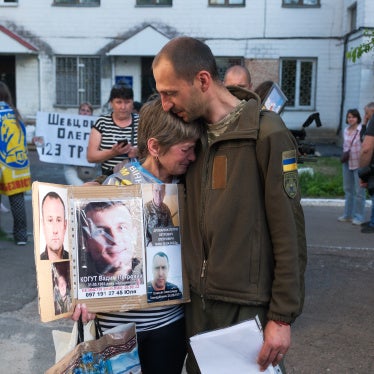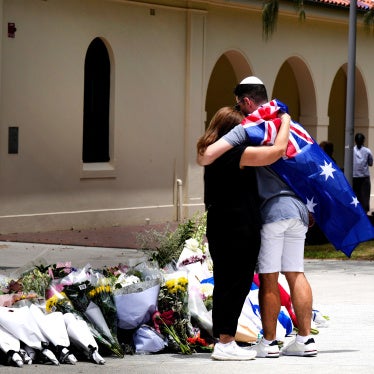(New York) - The United Nations Security Council should impose and enforce a mandatory arms embargo on Burma because of continuing massive violations of human rights, Human Rights Watch said today. India, China, Russia, and other nations are supplying Burma with weapons that the military uses to commit human rights abuses and to bolster its ability to maintain power.
“It’s time for the Security Council to end all sales and transfers of arms to a government that uses repression and fear to hang onto power,” said Brad Adams, Asia director at Human Rights Watch. “Instead of continuing to protect Burma’s abusive generals, China and Russia should join other Security Council members to cut off the instruments of repression.”
India appears to be one of the two main suppliers of advanced modern arms to the Burmese military. Earlier this year, India sold Burma two BN-2 Defender maritime surveillance aircraft that India had bought from the United Kingdom in the 1980s. The aircraft were delivered in August despite the British government’s objections that they were being supplied to a country under a European Union arms embargo. Later this year, India sold T-55 tanks and 105mm artillery pieces to the Burmese military. As it wages war against ethnic insurgents, the military routinely uses weapons such as artillery and mortars in conflict areas to destroy villages and exact retributions against civilian settlements.
India is currently preparing to send Burma aircraft, artillery, armored personnel carriers, tanks, ships, and a host of small arms in the next year. Perhaps most alarming, India has offered to sell newly developed Advanced Light Helicopters (ALH) to Burma, manufactured by Hindustan Aeronautical Limited (HAL). These helicopters, if delivered, would give the Burmese military a sophisticated weapon platform to fire rockets and guns, which could be used with devastating effect against political demonstrations in urban areas or rural villagers.
According to a recent report from Saferworld and Amnesty International, the Advanced Light Helicopters use superior European rockets and guns, as well as powerful French engines. Human Rights Watch urged the manufacturers and countries where these products are made to call on the Indian government to end sales to Burma and to ensure proper monitoring and implementation of end-use agreements.
“India’s close relationship with the Burmese military is a discredit to the ‘world’s largest democracy,’” said Adams. “The Indian authorities should be leading the efforts to end the supply of arms being used against the democracy movement in Burma.”
China is the other main arms supplier. It has supplied Burma with advanced helicopter gunships, arms production technology, and support equipment such as trucks and vehicles. Chinese-manufactured Mi-8 helicopter gunships have been photographed supporting Burmese military actions in eastern Burma where Burmese troops have committed numerous war crimes against civilians and massive displacement in its attacks on ethnic minority separatist groups. Beijing has also supplied small arms, including mortars, landmines, and assault rifles, as well as assistance in setting up an indigenous small-arms production capability. China has supplied a vast array of advanced military hardware to Burma, including fighter planes, naval vessels and tanks, and other infantry support weapons.
“China says it wants stability and a peaceful solution to the crisis in Burma,” said Adams. “But as long as Beijing continues to arm the Burmese military and give it political cover, the situation in Burma will remain violently unstable.”
Russia is also a noted supplier of arms to Burma, which includes a deal for MiG-29 fighter planes in 2002.
South Korean companies including Daewoo International Corporation and several others have been accused of illegally boosting the capacity of the Burmese army to produce weaponry. Daewoo reportedly supplied technology and equipment to build a factory to produce mortar rounds near the town of Prome, leading to South Korean investigations and indictments against company officials.
North Korea has supplied truck-borne multiple launch rocket systems (MLRS) and artillery pieces to Burma. North Korean engineers have also been contracted to build an underground tunnel complex at the new national capital at Nay Pyi Daw in central Burma, where the military leadership is based.
Burma has also reportedly received weapons from Israel. In 2005, Israel was reported to have sold 150 Brazilian EE-9 Cascavels light tanks to Burma.
Human Rights Watch said that an arms embargo should also include a ban against training the Burmese military, paramilitary, and police forces, all of which have been used to crush the pro-democracy movement in Burma. According to information received by Human Rights Watch, there are hundreds of Burmese defense forces officers being trained in military academies in Russia on nuclear physics, artillery techniques, and computer technology. Exiled Burmese media groups report that cyber-warfare activities that hacked their sites in the past week originated in Moscow. Russia and the Ukraine also have a number of technical staff based in Burma to train Burmese air force and army personnel. Australia has included Burmese police and military officers in its counterterrorism training workshops at centers in Indonesia.
Other nations involved in training the Burmese military include China, which continues to train fighter pilots following the sale of F-7 Airguard fighter planes in the 1990s. The recent sales of advance weaponry from India will also require training assistance. India has also offered Special Forces training to Burmese military units to aid joint operations along the shared border along northeast India and western Burma.
“The nations of the world are arming and training the Burmese military at the same time that they condemn Burma’s human rights violations,” Adams said. “These countries should back up their rhetoric with actions to avoid complicity in attacks on the Burmese people.”
The Burmese spend an estimated 40 percent of the government budget on the military, while combined health and education expenditure is among the lowest in Asia. Military-run hospitals and schools are the best in the country, while civilian hospitals are poorly funded and cannot respond to the widespread health crisis in HIV/AIDS, tuberculosis, and malaria. While Burma’s people are among the poorest in the region, senior military officials live lavish lifestyles. Instead of working to improve the lives of its people, the military also routinely seizes land from civilians for defense establishments and frontline bases, using forced labor in construction.
“The world should insist that the Burmese government address the country’s massive poverty and build up its health and education infrastructure,” said Adams. “Instead, many countries are draining Burma of its limited resources through military sales, profiting handsomely while many Burmese struggle to put food on the table.”





